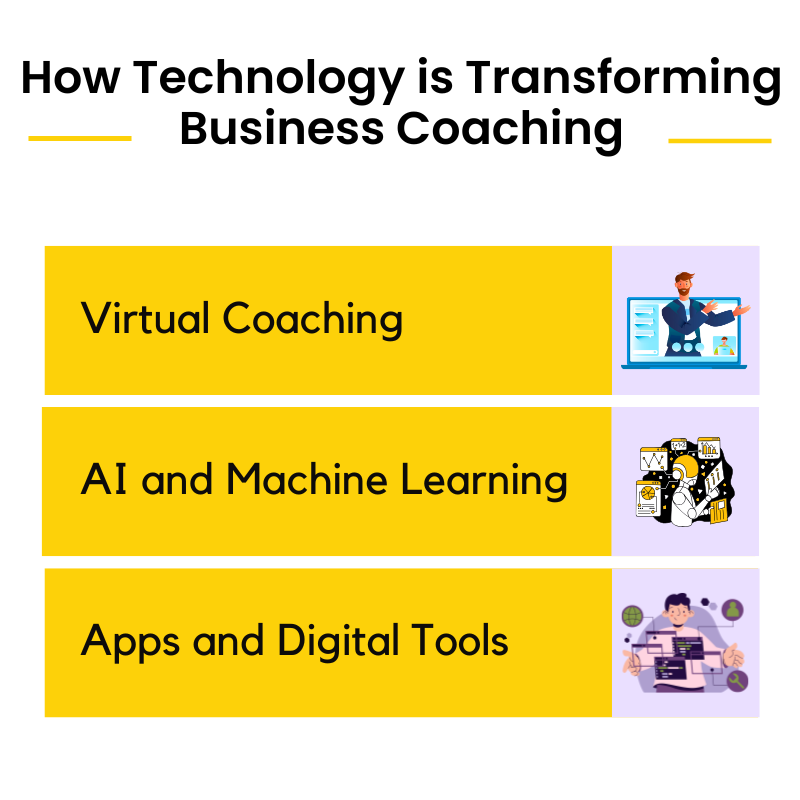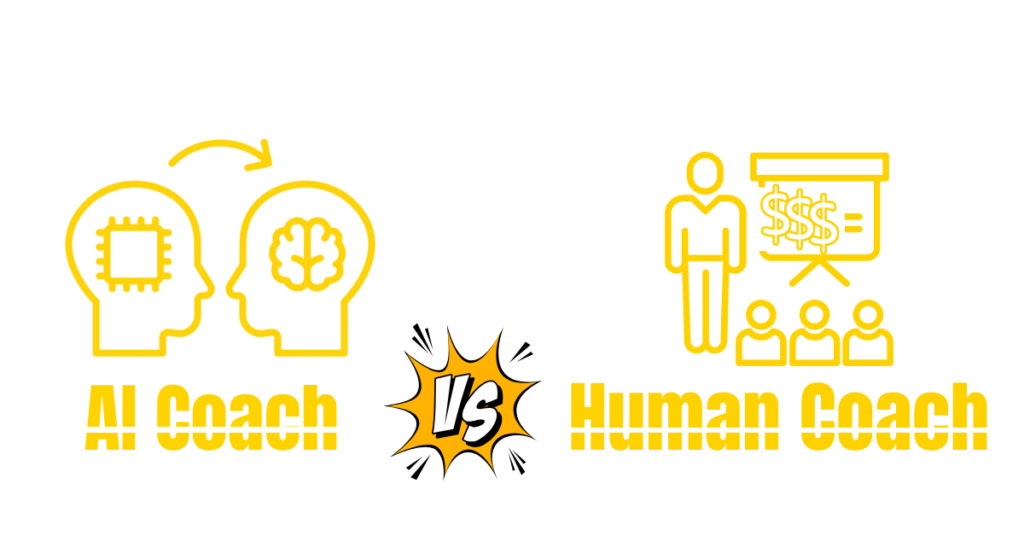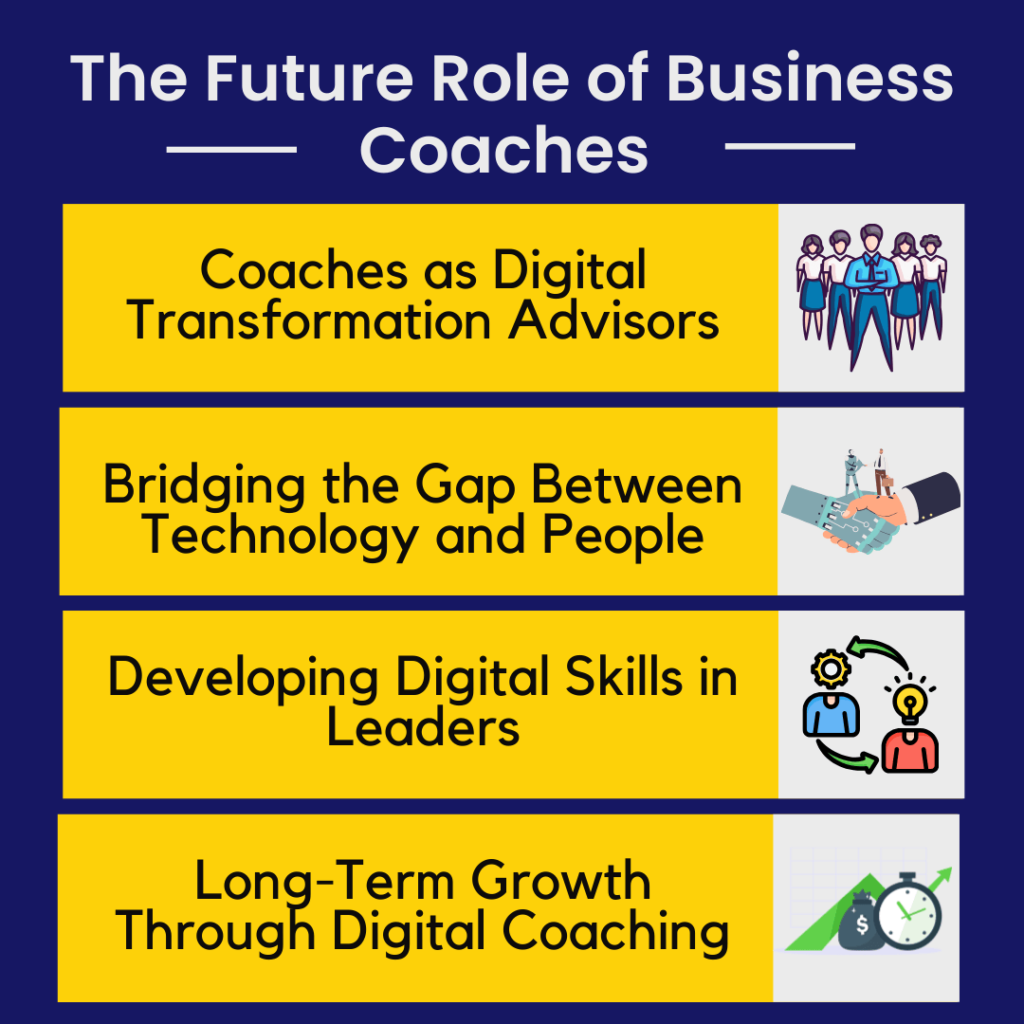In the ever-evolving landscape of business, staying ahead requires not only adaptability but also the right guidance. Business coaching has long been a vital tool for leaders and entrepreneurs seeking to sharpen their skills, foster innovation, and achieve success. However, as technology continues to transform industries, the role of business coaching is undergoing a significant shift.
In this digital age, virtual platforms, AI-driven tools, and data analytics are reshaping how coaching is delivered and experienced. The future of business coaching is becoming more dynamic, personalized, and accessible, offering new opportunities for growth and development. This article explores the profound impact technology is having on business coaching, highlighting emerging trends, challenges, and the exciting opportunities that lie ahead. Whether you’re a coach or a business leader, understanding these changes is key to thriving in a rapidly changing world.
The Impact of Technology on Business Coaching
In recent years, technology has completely reshaped the landscape of business coaching. With the rise of digital platforms and innovative tools, coaching has become more accessible, efficient, and tailored to individual needs. Entrepreneurs and business professionals can now engage with expert coaches across the globe without geographical limitations. Technology has allowed coaching to evolve into a more dynamic and interactive experience, offering both real-time guidance and data-driven insights that were previously unimaginable.
Virtual Coaching Platforms
Virtual coaching platforms have become a cornerstone of modern business coaching. These platforms provide a convenient and flexible way for individuals to connect with coaches from anywhere in the world. With the click of a button, clients can schedule sessions, track progress, and access resources tailored to their unique business challenges. This flexibility is especially beneficial for busy entrepreneurs who need personalized coaching but have limited time for in-person sessions. Platforms like Zoom, Microsoft Teams, and dedicated coaching apps make it easier than ever to engage in meaningful, productive coaching conversations.
AI and Machine Learning in Coaching
AI and machine learning are revolutionizing business coaching by enabling more personalized and data-driven approaches. These technologies can analyze patterns in client behavior, performance, and even emotional responses to provide tailored coaching strategies. For example, AI-powered tools can track a client’s progress and suggest adjustments to their coaching plan in real-time, helping coaches offer more targeted advice. Machine learning algorithms can also predict potential challenges a client might face, allowing coaches to proactively address those issues. As AI continues to advance, it will further enhance the effectiveness of coaching by providing deeper insights into human behavior and business performance.
Coaching Apps and Digital Tools
The rise of coaching apps and digital tools has made business coaching more accessible and interactive. These tools allow clients to engage in self-paced learning, track their goals, and receive feedback outside of scheduled sessions. Apps like Coach Accountable and Pocket Coach offer features such as task tracking, habit-building exercises, and video tutorials, making it easier for clients to stay accountable and motivated. Digital tools also enable coaches to stay connected with clients in real-time, providing support and feedback as needed, creating a more continuous and supportive coaching experience.

Key Trends Shaping the Future of Business Coaching
As business coaching evolves, several pivotal trends are redefining how professionals seek guidance and achieve results. These trends are not only about keeping up with change but about unlocking new potential in leadership, productivity, and growth.
Personalization Through Data
Data-driven coaching is becoming indispensable in tailoring strategies to meet the unique needs of each individual. Coaches now leverage analytics to identify precise performance metrics, track progress, and adjust their approach in real-time, leading to more impactful outcomes. With data, coaches can provide highly personalized solutions, identifying key areas for improvement and refining their advice to address specific challenges. This level of customization ensures that coaching remains relevant and deeply aligned with a client’s goals.
Example: By utilizing data insights, a client I worked with overcame significant leadership hurdles, increasing team retention by 15% in six months. Real-time analytics helped us tweak the coaching plan, making it more effective in addressing leadership blind spots.
On-Demand Coaching
On-demand coaching is revolutionizing how professionals access guidance. No longer restricted to scheduled sessions, clients can now receive immediate, actionable advice exactly when they need it—whether during high-stakes meetings or critical decision-making moments. This real-time support is particularly valuable for entrepreneurs and executives facing urgent challenges, ensuring they make informed, strategic decisions on the fly.
Example: A client used on-demand coaching to navigate a time-sensitive negotiation, securing a major contract within 24 hours after a brief but essential coaching session. The ability to access just-in-time advice allowed the client to act confidently and decisively.
Blended Coaching Models
Blended coaching models combine the best aspects of in-person and digital engagement, offering flexibility without sacrificing the personal connection that traditional coaching provides. This hybrid approach allows clients to interact with their coach through digital platforms—using tools like progress trackers, video sessions, and real-time feedback—while still benefiting from face-to-face engagement when necessary. This model maximizes convenience and scalability, ensuring that clients can access coaching support regardless of time zones or busy schedules.
Example: A blended coaching strategy helped one of my clients maintain consistent leadership development despite frequent travel, leading to a 25% improvement in team performance. The combination of digital tools and in-person sessions ensured steady progress, even when in-person meetings weren’t feasible.
Coaching for Remote Teams
Coaching for remote teams is becoming increasingly vital as virtual work environments become the norm. Virtual leadership coaching equips managers with the skills to maintain high levels of engagement, collaboration, and productivity across geographically dispersed teams. This type of coaching helps leaders navigate the unique challenges of managing remote workers, ensuring they foster a cohesive and motivated team culture, even when physical distance is a factor.
Example: Through targeted remote leadership coaching, a client managing a global sales team improved team morale and increased productivity by 30% within three months, despite the challenges of working across different time zones. The coaching program focused on communication strategies, virtual team-building, and maintaining accountability across the team.
AI Coaches vs. Human Coaches: Striking the Perfect Balance
In the rapidly evolving world of business coaching, AI-powered coaches and chatbots are emerging as innovative tools that provide scalable, efficient solutions. These technologies are transforming the coaching experience, making it more accessible and data-driven. However, while AI tools bring numerous benefits, they also have limitations that highlight the enduring value of human insight and emotional intelligence.

Automated Coaching Solutions
AI-powered coaches and chatbots are revolutionizing the coaching landscape by offering real-time, automated responses to common client queries. These tools provide scalability, enabling coaches to manage more clients at once without compromising on quality. AI-driven platforms excel at tasks like data analysis, tracking performance metrics, and offering instant feedback based on specific client inputs. For example, if a client logs a particular milestone or challenge, AI can immediately analyze that data and suggest actionable steps, helping clients stay on track between live coaching sessions.
Real-time feedback is a key advantage of AI solutions, as clients no longer have to wait for scheduled sessions to receive guidance. This immediacy allows for continuous progress monitoring, making coaching more dynamic and responsive.
Benefits and Limitations of AI Coaches
AI coaches offer several significant benefits. They are highly convenient, accessible, and efficient, able to process large volumes of data quickly and identify trends that might take human coaches longer to uncover. These tools can track progress, recommend changes, and provide feedback at any time, allowing clients to benefit from constant support. Additionally, AI’s ability to crunch data means it can help clients spot performance gaps, areas for improvement, or opportunities for growth with impressive accuracy.
However, despite these advantages, AI has its limitations. While it excels at data analysis and performance tracking, AI lacks the emotional intelligence and empathy that are critical for deeper, more transformative coaching. Coaching is not just about solving problems or hitting targets—it’s about understanding the nuances of human emotions, motivations, and challenges. AI may be able to suggest a new strategy or track a client’s goals, but it cannot provide the same level of personal, human-centric guidance that comes from a coach’s intuition, experience, and ability to connect emotionally with their client.
The Human Element in Digital Coaching
Despite the rise of AI in the coaching world, the human element remains irreplaceable. While AI tools can enhance the coaching process by providing valuable data insights, it’s the coach’s ability to interpret those insights and apply them within the broader emotional and relational context of the client that drives real breakthroughs. Human coaches offer personalized, empathetic guidance that considers not just the numbers but also the client’s unique challenges, aspirations, and emotional state.
Meaningful coaching relationships thrive on trust, connection, and intuition—qualities that AI simply cannot replicate. The synergy between human empathy and AI’s data-driven capabilities presents an ideal model for the future of coaching, where technology supports but does not replace the essential human touch.
The Future Role of Business Coaches in Digital Transformation
As businesses increasingly embrace digital transformation, business coaches are becoming strategic partners in guiding leaders through the process. Coaches will not only help organizations adopt new technologies but also ensure these advancements align with their long-term business objectives. By offering strategic insights and fostering digital skills, coaches will play a pivotal role in navigating the complexities of change and preparing leaders for a tech-driven future.
Coaches as Digital Transformation Advisors
Business coaches are evolving into essential advisors, helping leaders integrate digital tools such as automation, AI, and data analytics to drive growth and improve efficiency. Their role now extends beyond traditional leadership development, focusing on how technology can transform operations, customer engagement, and innovation. Coaches will ensure that digital initiatives are not just implemented but are strategically aligned with business goals, creating a roadmap for long-term success.
Bridging the Gap Between Technology and People
One of the biggest challenges in digital transformation is managing the cultural shift within organizations. Coaches will be crucial in bridging the gap between technology and people by helping leaders foster a workplace culture that embraces innovation and change. They’ll guide leaders in effective communication, ensuring that employees understand and support the digital transition. By coaching leaders to inspire their teams, coaches will help organizations overcome resistance to change and encourage active participation in the transformation process.
Developing Digital Skills in Leaders
As technology becomes more integrated into every aspect of business, future business coaching will increasingly focus on developing digital literacy among leaders. Coaches will help clients understand emerging technologies like AI, automation, and data analytics, enabling them to make informed decisions in a rapidly changing environment. Beyond technical understanding, coaches will focus on building the resilience, adaptability, and strategic thinking required to lead successfully in a digital-first world.
Long-Term Growth Through Digital Coaching
Coaching will play a key role in fostering long-term growth by helping leaders develop a mindset of continuous improvement in a tech-driven landscape. Coaches will not only address short-term challenges but also guide leaders in cultivating the skills and adaptability needed to thrive in the long run. By focusing on resilience, innovation, and strategic technology adoption, coaches will enable organizations to stay competitive and grow sustainably in an ever-evolving digital world.

Challenges and Opportunities in Digital Business Coaching
As digital business coaching continues to grow, new technologies introduce both significant challenges and exciting opportunities. Coaches must navigate these complexities to deliver effective and meaningful experiences for their clients.
Challenges of Digital Business Coaching
- Digital Fatigue: With constant screen time, both coaches and clients are at risk of digital fatigue, leading to burnout. Prolonged virtual sessions can reduce engagement and diminish the effectiveness of coaching, as participants may struggle to stay focused and energized.
- Building Trust Virtually: Establishing rapport in a virtual setting can be more challenging than in-person interactions. Without the benefit of physical presence and non-verbal cues, building a deep sense of trust and connection may take longer and require more intentional communication.
- Technology Barriers: Access to reliable digital tools isn’t universal. Clients or coaches with poor internet connectivity or outdated technology may face interruptions, limiting the reach and effectiveness of virtual coaching. Additionally, navigating different platforms can sometimes become a barrier to seamless communication.
- Maintaining Accountability: In virtual environments, it can be harder for coaches to hold clients accountable. The distractions of home offices or remote workspaces can pull clients away from their goals, making it crucial for coaches to establish strong systems of accountability in their programs.
- Over-Reliance on Technology: While technology enhances coaching, an over-reliance on it can diminish the personal connection that is critical for transformation. Coaches must ensure that they don’t lose the human touch, as empathy, intuition, and emotional support are often what drive real breakthroughs.
Opportunities in Digital Business Coaching
- Expanding Global Reach: With virtual coaching, geographical boundaries disappear. Coaches can now work with clients from all over the world, expanding their client base and making their services more accessible to diverse audiences.
- Flexibility and Convenience: Virtual coaching provides unparalleled flexibility. Clients can fit coaching sessions into their busy schedules, eliminating the need for travel and allowing them to engage from the comfort of their homes or offices. This flexibility can lead to higher engagement and consistency in coaching.
- Data-Driven Insights: The use of technology allows coaches to track client progress and provide real-time feedback through data-driven insights. Coaches can use performance metrics, goal tracking, and behavioral data to offer more precise, actionable advice, ensuring that coaching is tailored to each client’s needs.
- On-Demand Coaching: With the availability of digital platforms, clients can access just-in-time coaching when they need it most. This is particularly valuable in high-stress situations, such as navigating negotiations or making strategic decisions, allowing clients to get immediate guidance without waiting for a scheduled session.
- Hybrid Coaching Models: Hybrid coaching, which blends in-person interaction with digital tools, offers the best of both worlds. Clients benefit from the personalized connection of face-to-face sessions, while digital tools provide ongoing support, progress tracking, and real-time feedback. This model ensures that coaching is both scalable and deeply personal.
The Balance Between Challenges and Opportunities
The future of business coaching lies in effectively balancing these challenges and opportunities. Coaches who can adapt to the digital landscape without sacrificing the personal elements of coaching will be the most successful in fostering lasting growth for their clients. By leveraging the power of technology while maintaining a human-centered approach, business coaching will remain a powerful tool for transformation in the digital age.
Conclusion
The digital transformation of business coaching offers an exciting path forward. By blending technology with human expertise, business coaching is becoming more accessible, personalized, and impactful. Although challenges like digital fatigue and building virtual rapport exist, the opportunities far outweigh them.
From global reach to AI-driven insights, the future of coaching is bright. Coaches who embrace this hybrid model will empower leaders to adapt, thrive, and grow in an ever-evolving digital world. Ready to take the next step? Contact me today and let’s explore how digital business coaching can drive your success.
FAQ
How do I find the right business coach in a digital setting?
Look for a coach with expertise that matches your goals, read reviews or testimonials, and consider trying a free consultation. Many digital coaches offer introductory sessions to ensure a good fit before you commit to a full program.
What platforms are commonly used for virtual business coaching?
Common platforms include Zoom, Microsoft Teams, and specialized coaching tools like Coach Accountable and Better Up. These platforms enable video sessions, goal tracking, and progress monitoring to enhance the coaching experience.
Can AI-powered coaching fully replace human business coaches?
No, AI coaching tools offer data-driven insights but lack the empathy, creativity, and personal connection that human coaches provide. AI complements human coaching but can’t fully replace the emotional intelligence and strategic thinking of a human coach.
How do digital business coaches maintain accountability with clients?
Digital coaches use apps, progress trackers, and regular check-ins to ensure accountability. Automated reminders, goal-setting tools, and performance dashboards keep clients on track and engaged with their coaching programs.
Is digital business coaching effective for entrepreneurs and startups?
Yes, digital coaching is effective for entrepreneurs, offering tailored strategies, flexible scheduling, and real-time feedback. It’s especially valuable for startups needing affordable guidance to navigate early-stage challenges and growth.
What should I expect from a hybrid coaching model?
A hybrid model combines digital and in-person sessions, offering flexibility through online tools with the personal touch of face-to-face meetings. This approach provides convenience and depth for personalized, effective coaching.





